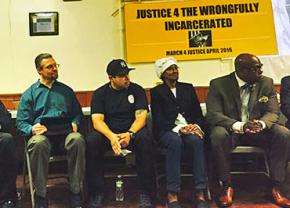What will change a system of injustices?
reports on a panel discussion about strategies to win justice for those who have been victimized by the injustice system.
ON NOVEMBER 7, some 40 people turned out for a public meeting in Mount Vernon, New York, titled "Justice for the Wrongfully Incarcerated."
The meeting started with a showing of the film The Central Park Five, a stirring documentary about the wrongful conviction of five Black teenagers for the 1989 rape of a white woman in Central Park. The case was used by politicians and the media--including Donald Trump--to push for more police, more jails and tougher sentencing.
After the film showing, the meeting moved into a lively panel discussion with active audience participation. Panelists included Yusef Salaam, one of the Central Park Five; Sharonne Salaam; Damon Jones of Blacks in Law Enforcement of America; Jefffery Deskovich; Jose LaSalle of Cop Watch NYC; William Bastuk of It Could Happen To You; and this author, representing the International Socialist Organization. The meeting sought to draw connections between past acts of wrongful incarceration and today's movements for racial justice and against the criminal injustice system.

Participants also highlighted the budding group March 4 Justice in New York City, which is planning both local and statewide demonstrations to gain justice for the wrongfully convicted and for radical reforms of the criminal injustice system.
Many agreed that one of the primary issues is holding the police accountable for their actions. For instance, New York currently has a bill pending in the state legislature (S5875/A8157) that would reform lineup and photo array identifications and require videotaping of felony interrogations. However, the bill does not include any penalties whatsoever against the police themselves if they decide to violate any of those laws. Participants agreed that cops should be fined, fired and/or criminally prosecuted for such violations.
Moreover, New York--supposedly a liberal bastion--has no laws on the books requiring any kind of recording of interrogations, no laws addressing eyewitness identification, no laws requiring preservation of evidence and an extremely weak law providing for compensation for the wrongfully convicted.
This puts New York behind such states as Texas, Georgia, Alaska, Mississippi, Arkansas and Alabama, that do have at least some laws on the books addressing those issues, however weak they may be.
The meeting concluded with a call for more direct action campaigns--with possible marches on City Hall and the state Capitol building in Albany next spring. While our movement may give qualified support to certain legislative proposals, its ultimate place is in the streets, not in the hallowed halls of power.
We don't want to tinker with the criminal injustice system, we want to bring it down. To do so, our movement cannot ask of our elected representatives, "Please give us some justice?" Instead, we need to set forth our list of demands--and follow through with sit-ins, sit-downs, blockages, mass marches and other forms of civil disobedience if those demand are not met.


